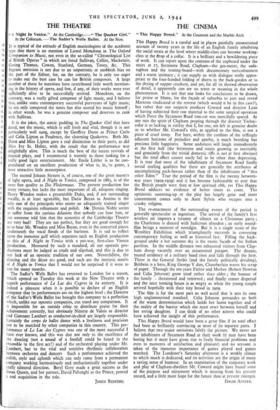THE CINEMA
" This Happy Breed." At the Gaumont and the Marble Arch
This Happy Breed is a careful and in places painfully unsweetened account of twenty years in the life of an English family inhabiting the social strata at the level where middle-class can become working- class at the drop of a collar. It is a brilliant and a bewildering piece of work. It can report upon the contents of the cupboard under the stairs at 17, Sycamore Road, Clapham—the gas-meter, the soda- syphon and the ironing-board—with documentary meticulousness and a warm intimacy ; it can supply us with dialogue really appro- priate to the four-handed folding of sheets in the back-garden or to the drying of supper crockery, and yet, for all its shrewd observation of detail, it apparently can see no sense or meaning in the whole phenomenon. It is not that one looks for conclusions to be drawn, for praise or blame, for the facade of suburbia to part and reveal Marxism vindicated or the reverse (which would it be in this case?), but rather that one suspects producer Coward and director Lean of having subjected their raw material to the same surgical operation which Pence the Sycamore Road tom-cat was mercifully spared. At any rate the spirit of Clapham peeping through the discreet Techni- color is so lacking in virility that I, for one, am left in genuine doubt as to whether Mr. Coward's title, as applied to the film, is not a piece of cruel irony. For here, within the confines of the stiflingly adjacent horizons of prejudice and apathy, is much breeding but precious little happiness. Some audiences will laugh immoderately at the first half (the bitterness and strain growing so inevitably and genuinely from the trivial domestic tiffs is not at first obvious) but the total effect cannot easily fail to be other than depressing. It is true that most of the inhabitants of Sycamore Road finally reveal sterling qualities but these are generally the attributes of uncomplaining pack-horses rather than of the inhabitants of " this other Eden." True the period of the film is the twenty between- war years (1919-1939) and it has become fashionable to aver that the British people were then at low spiritual ebb, yet This Happy Breed adduces no evidence of better times to come. The optimistic summing-up of the play has largely gone and inner contentment comes only to Aunt Sylvie who escapes into a cranky religion.
The re-enactment of the outstanding events of the period is generally spectacular or ingenious. The arrival of the family's first wireless set imposes a tyranny of silence on a Christmas party ; the Charleston is danced with ludicrous abandon ; an early sound- film brings a moment of nostalgia. But it is a single scene of the Wembley Exhibition which triumphantly succeeds in conveying contemporary feeling as well as historical fact. Filling the back- ground under a hot summer sky is the exotic facade of the Indian pavilion. In the middle distance two exhausted visitors from Clap- ham droop vacantly over an ornamental parapet. The distant, muted stridency of a military band rises and falls through the heat. There is the General Strike (and the family politically dividing), Baldwin is a hero, King George V dies, Chamberlain waves his scrap of paper. Through the ten years Father and Mother (Robert Newton and Celia Johnson) grow tired rather than older ; the honour of the family :. threatened and retrieved ; and finally comes dispersal and the once teeming house is as empty as when the young couple arrived hopefully with their tiny brood in 1919.
The film is for the most part so well acted that it sets its own high unglamourised standard. Celia Johnson persuades us both of the warm determination which holds her home together and of the reality of the barrier which she must erect between herself and her erring daughter. I can think of no other actress who could have achieved the insight of this performance.
This Happy Breed would have been a great film if its total effect had been as brilliantly convincing as most of its separate parts. I believe that two major omissions falsify the picture. We never see the inhabitants of Sycamore Road at their work (it may have been boring but it must have given rise to lively financial problems and even to moments of satisfaction and pleasure) and no account is taken of the immense importance of games played and games watched. The Londoner's Saturday afternoon is a weekly climax to which much is dedicated, and its activities are the origin of many a saving sense of humour. In an examination of the corporate work and play of Clapham-dwellers Mr. Coward might have found some of the purpose and enjoyment which is missing from his present record, and a little more hope for the future than at present emerges.
EDGAR ANSTEY.


























 Previous page
Previous page